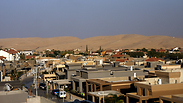
Time to share the wealth in Israel
Op-ed: While some regional councils benefit from high municipal taxes, those who contribute to such riches – such as hospitality and factory workers – live in areas that do not enjoy the fruits of their labor.
For some 60 years now, Israel's development towns have been sitting on limited tracts of land, while the regional councils alongside them, with their kibbutzim and moshavim and rural communities, occupy huge areas and fill their coffers with fat municipal taxes from their industrial and commercial zones, and from the resident defense installations – all of which are attached to the regional councils and not the development towns.
Before he resigned, Interior Minister Gideon Sa'ar had the time to loudly herald the righting of "this historical wrong." This correction is a welcome and important one, but one must understand that it is very limited, as it pertains to only two of the country's 53 regional councils, and also because Sa'ar did not alter the jurisdiction boundaries: He simply persuaded two wealthy men in the Negev to do their neighbors a favor and donate to them a few pennies from their overflowing coffers.
Dimona and the Tamar Regional Council are a fine example of the distorted way in which the state distributes municipal wealth. Tamar occupies an area of 1.7 million dunams – 10 times the area of Dimona, which has twice the amount of people. Included in the regional council are factories (the Dead Sea Works among them), beaches, tourist attractions and hotels, and Tamar rakes in municipal taxes to the tune of NIS 80 million a year – annual income of more than NIS 60,000 per resident.
Neighboring Dimona's income from municipal taxes is just NIS 1,600 per resident. Most of the workers at the factories and hotels attached to Tamar are Dimona residents; in other words, the Dimona residents are contributing to the generation of this wealth by the regional council, but are excluded from the bursting coffers.
The Ramat HaNegev Regional Council and the city of Yeruham paint a similar picture: Israel Defense Forces bases in the area are attached to the regional council; as a result, while Yeruham is burdened with a budget deficit of more than NIS 17 million a year, Ramat HaNegev enjoys surplus income of close to NIS 24 million annually.
.
This intolerable discrepancy with respect to the allocation of income-generating land and assets does not exist in the Negev alone, but all throughout Israel. Kiryat Shmona, for example, lies on a limited area of jurisdiction that restricts the its development; meanwhile, the regional councils bordering the city occupy huge areas that allow them to construct new neighborhoods and establish industrial and commercial zones, which bring in vast sums of money in taxes.
This extreme divide is the result of an indifferent government policy that condemns citizens from various communities to a life of structured inequality. How is it that such a distorted policy can be so openly implemented for so many years? It all started with Labor Party precursor Mapai's land politics, which gave preference to agricultural settlements over development towns; and the Likud picked up the baton in choosing through its long years in power to perpetuate this absurd distribution.
The political clout of the regional councils offers another explanation for the situation. They make use of lawyers, lobbyists and primarily party ties to prevent a redistribution of the areas of jurisdiction. Shmuel Rifman, who heads the Ramat HaNegev Regional Council, once bragged of how the planned Israel Defense Forces' eight-base training facility in the Negev would be attached to his regional council (a decision that was subsequently revoked).
"Two people made that decision – Ariel Sharon and I," Rifman said at the time.
And Gideon Sa'ar? Well done to him for taking a little from two wealthy regional councils to give to very poor municipal authorities; bear in mind, however, that because of this supplement they are set to receive, the Interior Ministry in the future will be reducing the grants they currently get. In other words, what the Interior Ministry has arranged for them today, the Interior Ministry will take back from them tomorrow.
We are in dire need of a new order – an adjustment of all the areas of jurisdiction throughout the country, and a fair distribution of the regional wealth.










